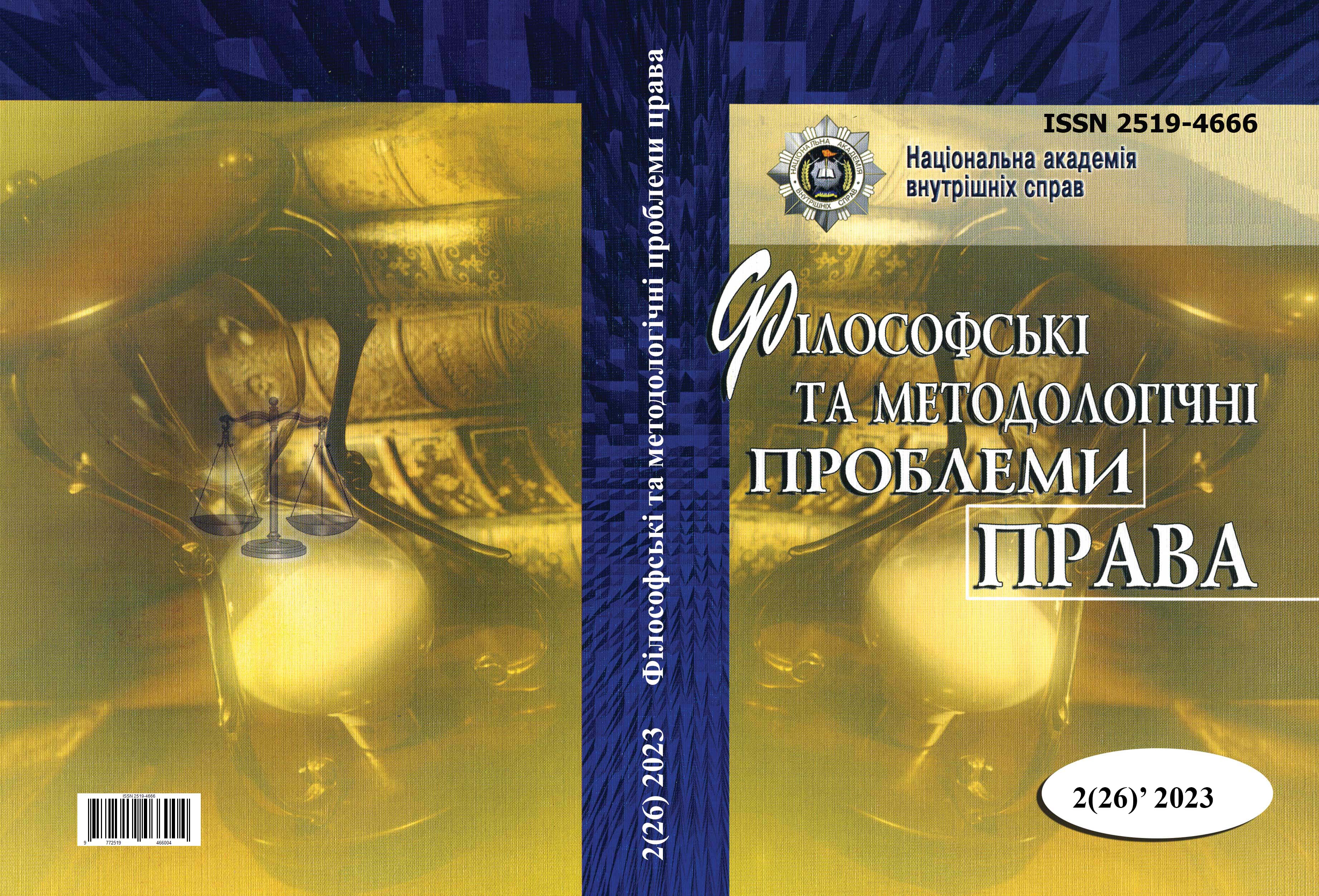Methodology of Studying the Idea and Essence of Civil Society in the Context of European Integration Processes
Abstract
Abstract. The relevance of the study is due to some uncertainty about the issues related to the choice of methods for studying the idea of civil society. The authors argue that the transformational changes and processes of European integration cause changes in consciousness, which entail the problem of citizens' misunderstanding of the essence of civil society, insufficient awareness of their own role, which requires an integrated approach to study its idea and processes using a number of methods and methodological approaches. The purpose of the study is to identify the methodological patterns of studying the idea and essence of civil society in the context of European integration processes, to analyze its essence, to rethink the philosophical and methodological foundations in the context of future development prospects and to form a regulatory framework that will meet the current vision on this basis. The methodological basis of the study is an integrated approach. The material presented in the article has a certain scientific novelty, since the category of civil society is ambiguous, not clearly defined in the legislation, which causes different opinions regarding the processes of its development in the processes related to EU accession and necessitates a thorough analysis in the philosophical and legal plane with the use of appropriate methodology. It is proved that the analysis of the essence of civil society cannot be carried out using a single methodological approach or method. The complexity of the category requires a comprehensive analysis, due to the multidimensional nature of the phenomenon under study. The practical significance of the study lies in the fact that the authors have identified the most appropriate methods and methodological approaches that will allow analyzing the idea of civil society with regard to European integration transformations in the state.
Keywords: methodology; methods; European integration; civil society; methodological approaches.
Downloads
References
Afonin, E.A., Bandurka, O.M., & Martynov, A.Yu. (2002). The Great Spillover (Global Problems of the Present: Socio-Philosophical Analysis). Kyiv.
Andrushchenko, V.P. (Ed.). (2005). Philosophical dictionary of social terms (3rd ed.). Kharkiv: R.Y.F.
Brovko, N.I., Danylenko, A.S., & Kushakova-Kostytska, N.V. (et al.). (2014). Philosophical and legal principles of combating illegal migration and human trafficking in civil society. Bila Tserkva: BNAU.
Brovko, N.I. (2017). Methodology of Research on the Category of Legal Consciousness of Rural Residents. Scientific Bulletin of Public and Private Law, 3, 225-228.
Coleman, J.L. (2012). Methodology. The Oxford Handbook of Jurisprudence and Philosophy of Law. Oxford. doi: 10.1093/oxfordhb/9780199270972.013.0008.
Dickson, J. (2022). Methodology in Legal Philosophy (Chapter 1: Meta theory of Law), (pp. 1-29). London: Wiley. doi: 10.1002/9781394163694.ch1.
Forster, M. (2006). Hegel's dialectical method (Chapter 5: The Cambridge Companion to Hege), (pp. 130-170). F.C. Beiser (Ed.). Cambridge: Cambridge University Press. doi: 10.1017/CCOL0521382742.006.
Kant, I. Critique of Pure Reason. Retrieved from http://weblib.pp.ua/kritika-chistogo-razuma-per-nem-losskogo.html.
Karas, A.F. (2002). Civil Society: Stages of Formation and Conceptual Features of Interpretation. Vostok: analytical and informational journal, 4(47), 54-59.
Kostytskyi, M.V. (2017). Dialectical method in jurisprudence. In The Great Ukrainian Legal Encyclopedia (Vol. 2), (pp. 216-221). Kharkiv: Pravo.
Kostytskyi, M.V., & Kushakova-Kostytska, N.V. (2023). Methodology of theoretical and practical cognition in jurisprudence as a scientific and practical complex. Philosophical and methodological problems of law, 1(25), 9-17. doi: 10.33270/01232502.9.
Kostytskyi, M.V. (2013). Some issues of methodology of legal science. Scientific Bulletin of the National Academy of Internal Affairs, 1, 3-11.
Langlinais, A., & Leiter, B. (2016). Methodology of Legal Philosophy. Oxford Handbook of Philosophical Methodology (pp. 671-689). H. Cappelen, T. Sz. Gendler, J. Hawthorne (Ed.). Oxford: Oxford University Press.
Levitt, H.M. (2020). Methodological integrity: Establishing the fidelity and utility of your research. Reporting qualitative research in psychology: How to meet APA Style Journal Article Reporting Standards (pp. 29-41). Washington: American Psychological Association. doi: 10.1037/0000179-003.
Mikhailina, T.V, & Hotsuliak, Yu.V. (2021). Crisis of methodology of modern legal research. Scientific Bulletin of Uzhhorod National University, 65, 26-30. doi: 10.24144/2307-3322.2021.65.4.
Syla, V.H. (2016). Social role of the community in the conditions of transformation of Ukrainian society (Dissertation Chernihiv, Ukraine).
Empirical and Doctrinal Scholarship. Law and Philosophy, 40. 33-66. doi: 10.1007/s10982-020-09388-1.
Abstract views: 84 PDF Downloads: 186
Copyright (c) 2024 Philosophical and Methodological Problems of Law

This work is licensed under a Creative Commons Attribution-NonCommercial-NoDerivatives 4.0 International License.
- Authors reserve the right to authorship of their own work and transfer to the magazine the right of the first publication of this work under the terms of the Creative Commons Attribution License, which allows other persons to freely distribute published work with mandatory reference to authors of the original work and the first publication of an article in this magazine.
- Authors have the right to enter into separate additional agreements on non-exclusive dissemination of the work in the form in which it was published in the journal (for example, to post an article in the institution's repository or to publish as part of a monograph), provided that the link to the first publication of the work in this journal is maintained.
- The journal's policy allows and encourages the posting of articles by authors on the Internet (for example, in electronic storehouses of institutions or on personal websites), both before the submission of this manuscript to the editorial office and during its editorial processing, as this contributes to the creation of a productive scientific discussion and positively affects the efficiency and dynamics of citing the published work.




